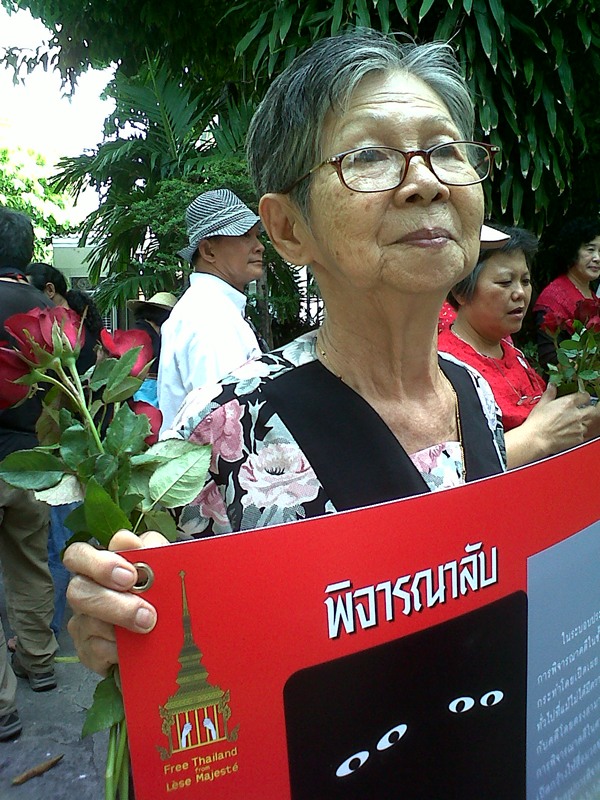Somsak Jeamteerasakul was warmly cheered up by a hundred or so supporters during his appearance yesterday at the Nang Lerng Police Station to hear a lese majeste charge regarding his response to Princess Chulabhorn’s recent interview.
Intellectuals and anti-article 112 activists as well as Red-Shirt members staged a short drama mocking the military’s huge sweep of the Abhisit administration’s budget and the government’s alleged palm oil price hike corruption. The supporters held placards “Free Thailand from Lese Majeste” and “Somsak, Do Keep Fighting” while waiting for more than an hour in the Nang Lerng police station compound.
Mr Somsak told reporters after acknowledging the charge that he would return to the Police Station again in two weeks with a formal defence document. He said he was confident that the obsolete article was not relevant to bring him down as the referred party, Princess Chulabhorn, was not under the realm of the lese majeste law. The historian also urged the public to pay attention to those being prosecuted with the charge to ensure their basic rights in the initial judicial proceedings, including bail.
Prajin Tanangkorn, an advocate for debtors, said his group turned up to “show support to a brave intellectual who did not fear to speak the truth.” Prajin’s younger brother, aka Suchart Nakbangsai, has also been imprisoned on lese majeste charges as a result of his internet messages. “Thailand is a democratic country, and we should be able to speak out, shouldn’t we?” said the 57-year-old Prajin.
A member of Santi Asoke’s Nakhon Pathom community Sumalee Sae Tiew, 80, also showed up to give a red rose to Somsak, who teaches history at Thammasat University’s Faculty of Liberal Arts.
“Thai society should move forward, if there’s no reform or some institutional adjustments, we will be in a disaster,” said Ms Sumalee, who lives in the nearby Bangkhunprom area.
She said she did not like double standards and that was why she, as an “Asoke Commune” member, had joined the “Saturday Group against the Coup”.
A well-known October-generation artist “Jin Kanmachon” (Proletariat) called for middle-class intellectual peers to realize the nature of democratic globalization.
Jin, whose real name is Kulasak Ruangkongkiat, led other supporters in singing “songs for life” in solidarity with Somsak.
“It’s quite disheartening that artists, media, and academics have turned ignorant about the people’s voice. Worse, they are siding with the conservatives who disguise themselves in the name of reform and reconciliation just for the purpose of taming the people so they will not think differently but docilely,” said Jin, 56, now a pharmacist.
Chanin Klayklung, 35, an engineer from the Air Force’s Directorate of Aero Nautical Engineering who has been prosecuted on lese majeste charge, also showed up to lend his support to Somsak. Mr Chanin, who has been charged by the military court since November for posting libellous songs and video deemed undermining of the monarchy, was given a military service suspension on 12 April. He will be defending himself in the military court on 12 July.
“I did not criticize my boss, which is certainly a disciplinary offence. But what I’ve done is exercising my freedom of speech by criticizing the government,” said Chanin. The lese majeste charge against him was brought by his supreme boss, the Air Force Chief.
Throughout the past few weeks nearly a hundred scholars residing in Australia, the US, the UK, Hong Kong, Denmark, Singapore, South Korea and Canada signed and released an open letter calling for an end to the constriction of freedom of expression in Thailand. Kevin Hewison, Director of the Carolina Asia Center at the University of North Carolina at Chapel Hill said the accusation against Somsak challenged the Prime Minister who has said that academic criticism would be tolerated. “How can he justify action against this well-known academic?” said Professor Hewison in the statement.
“Why is the Army filing charges against a historian?,” asked Craig Reynolds of the Australian National University. “While this is not the first time that the Army has filed charges against a civilian, every instance should be carefully scrutinized,” said Professor Reynolds.
The academics were not only concerned about Somsak but with several other instances of constriction of freedom of expression, including the widespread, coordinated raiding of community radio stations and the arrest of Somyos Prueksakasemsuk on charges of violating Article 112. The current political climate including both legal cases and extralegal intimidation has the effect of constricting speech and silencing dissent in Thailand, said Tyrell Haberkorn of the Australian National University. This will have an increasingly negative effect on the possibilities for human rights and democracy in Thailand, Dr Haberkorn said.
 Facebook
Facebook  Twitter
Twitter  Soundcloud
Soundcloud  Youtube
Youtube  Rss
Rss 
